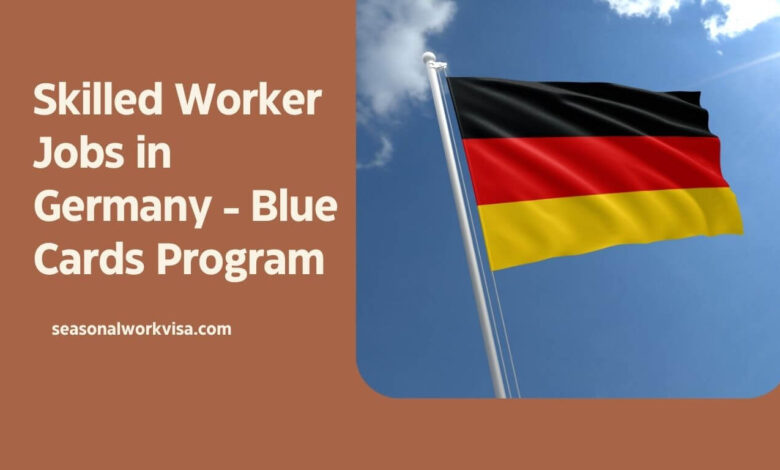Skilled Worker Jobs in Germany 2025 – Blue Cards Program

Are you frustrated with high salary thresholds and complex visa processes? Germany hears you. Recently, Germany simplified the process for skilled workers to obtain an EU Blue Card, making it significantly easier to live and work in the country.
This development is set to have a major impact on the global job market.
Check Also: Unskilled Jobs in Germany for Foreigners – Apply Now
What’s All the Fuss About?
The EU Blue Card is your gateway to living and working in Germany—and potentially other EU countries as well. Previously, the Blue Card was difficult to obtain due to high salary requirements and a limited list of eligible professions. But now, things have changed dramatically.
Here’s a breakdown of the recent changes to Germany’s Blue Card policy:
Key Changes:
- Lower Salary Thresholds
Say goodbye to unreachable salary requirements! The minimum salary for a Blue Card has been significantly reduced. You now need a minimum gross annual income of €45,300, which is around 1.5 times the average German salary. But there’s even better news if you’re in a high-demand profession. If your job is listed as a shortage occupation, such as healthcare, IT, or engineering, the minimum salary requirement drops to €41,041.80. - Expanded Eligibility
The list of eligible professions has grown, especially in areas like engineering, IT, and healthcare. Germany is actively seeking skilled professionals in these fields, making it easier for you to qualify for a Blue Card. If your skills are in high demand, your chances of being approved are higher. - Great News for Graduates
If you’ve graduated from university in the last three years, you may qualify for the Blue Card with a lower salary requirement of €41,041.80, regardless of your profession. This is a fantastic opportunity for recent graduates looking to kickstart their international careers in Germany. - IT Professionals, Take Note
Good news for IT experts: If you have at least three years of relevant professional experience in the IT sector, you may qualify for a Blue Card even without a university degree. Germany is recognizing the importance of practical experience in IT, opening doors for tech professionals who haven’t followed the traditional academic route. - Simplified Application Process
Germany has streamlined the application process, making it faster and easier to apply for the Blue Card. With reduced paperwork and a quicker processing time, you can spend more time enjoying Germany’s culture and beautiful cities and less time on bureaucratic tasks.
Benefits:
The EU Blue Card offers a wide range of benefits for skilled workers looking to live and work in Germany:
1. Competitive Salaries and Benefits
Blue Card holders enjoy competitive salaries. The salary threshold for most professions is €58,400 per year, while for in-demand professions like IT, engineering, and healthcare, it’s €45,552 annually. This ensures that skilled workers are fairly compensated for their expertise.
2. Fast Track to Permanent Residency
The Blue Card offers a pathway to permanent residency in Germany. After just 33 months of holding the Blue Card, you can apply for permanent residency. If you demonstrate a certain level of German language proficiency (B1 level), you can apply in 21 months. This provides skilled workers with a clear path to long-term stability in Germany.
3. Family Reunification
Blue Card holders can bring their family members to Germany more easily. Spouses and children of Blue Card holders can join them without waiting periods and are allowed to work in Germany, regardless of their profession. This simplifies the process and helps families settle in smoothly.
4. Access to Social Benefits
As a Blue Card holder, you’re entitled to the same social benefits as other German workers, including public healthcare, unemployment benefits, paid maternity/paternity leave, and pension contributions. These benefits provide security for both you and your family.
5. Professional Development Opportunities
Germany’s Blue Card program offers excellent opportunities for career growth. Blue Card holders can access training programs, certifications, and skills development initiatives to further their professional qualifications. This can help you advance your career both in Germany and internationally.
6. Global Networking and Exposure
Germany is home to many multinational companies and innovative industries, particularly in engineering, automotive, IT, and biotechnology. As a Blue Card holder, you’ll have access to cutting-edge technology and global networking opportunities that can accelerate your career.
7. High Quality of Life
Germany is known for its high standard of living. The country offers excellent healthcare, a strong work-life balance, and a stable economy. Blue Card holders benefit from generous vacation time and public services, as well as the chance to live in one of Europe’s most prosperous nations.
8. Mobility within the EU
After 18 months of holding a Blue Card in Germany, you can apply for a similar Blue Card in another EU country. This makes it easy to explore career opportunities across Europe without needing to go through a new visa application process.
9. Easy Renewal and Reapplication
Renewing your Blue Card is a simple process if you want to continue living and working in Germany. If you change jobs, you can update your Blue Card, as long as you still meet the salary and qualification criteria.
10. Language and Cultural Integration
While you don’t need to be fluent in German to apply for the Blue Card, living in Germany provides a great opportunity to learn the language and immerse yourself in German culture. The program encourages language learning, which helps Blue Card holders integrate more fully into German society.
Why Is Germany Doing This?
Germany has recognized the pressing need for skilled workers to maintain its competitive edge. Like many countries, Germany faces a shortage of qualified professionals in sectors like IT, healthcare, and engineering. To address this, the German government is making it easier for highly skilled workers from non-EU countries to immigrate and contribute to the country’s economy.
By lowering the salary thresholds, broadening the list of eligible professions, and simplifying the application process, Germany is opening its doors to talented workers from around the world.
Ready to Take the Leap?
The EU Blue Card program offers an incredible opportunity for skilled workers looking to live and work in Germany. With reduced salary requirements, expanded eligibility, and a faster, more straightforward application process, now is the perfect time to pursue your dream career in Germany.
If you have the qualifications, it’s time to take the next step. Polish up your CV, start learning German (or improve your skills), and get ready to say “Hallo” to your new life in Germany!
For more information on the EU Blue Card and how to apply, check out the official German Federal Government’s page on skilled immigration or visit Germany’s Ministry of Foreign Affairs.
Frequently Asked Questions:
Who is eligible for the Blue Card in Germany?
The Blue Card is available to university graduates and third-country nationals with specific professional experience. It’s designed to attract highly qualified workers to Germany.
Who qualifies as a skilled worker in Germany?
Skilled workers in Germany include those with vocational training, university degrees, or significant professional experience in their field.
What is the salary for a Blue Card job in Germany?
The minimum salary requirement is €45,300 annually for most professions, and €41,041.80 for high-demand professions like IT, engineering, and healthcare.




